Maine
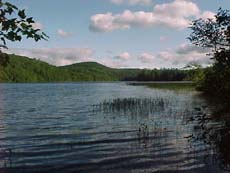
Heald Pond, Lovell, Maine
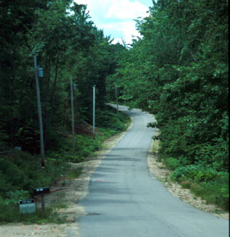
Maine road
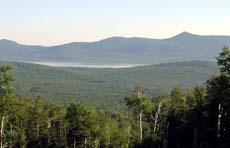
Forest on the Bigelow Range, Maine
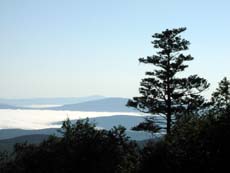
View from Sugarloaf Mountain, Maine
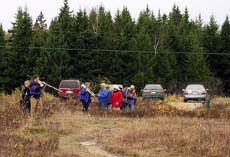
Birders at Petit Manan Reserve, Maine
Mid-morning I started for Auburn, driving north on the Greenwood road to get some baked goods at Hungry Hollow Farm. I hadn't been on that back road for years; it runs through forest and past occasional views of the hills, then by two thin lakes. In twenty miles, I passed three cars and two walkers. When I arrived at Greenwood City (pop. 689 -- "city" means that it once had the grain mill and store for the area), I turned east toward West Paris, following a river rushing and foaming from the rain and glistening in the sun under the trees.
Between the towns lie long stretches of uninhabited woods, here in the west of the state, and even more so up north. You feel how built places are set into a nature that goes its own way, that hasn't been pushed to the outskirts or put on display in a park. Folks did work it over a while back; you can see stone walls amid the trees; but now the woods are on their own except for occasional logging and hunting. It's not neat and it doesn't accommodate you. Making a path takes effort. You feel the presence of an other that has no social pretensions, only a flow of rhythms and effects. Its own patterns assert themselves in those long betweens, in the emphatic seasonal weather, in the porcupine that walked past us with total unconcern, in those bugs that want my blood. Patterns and places get made here, and you sense the labor of the making. So many run-down homes in clearings along the road; people getting by on odd jobs and state aid. Towns struggling to survive, but celebrating spring with cheerful flowers, little rituals, and road repair. The rhythms of nature intersect the grammars of our lives, all swayed by events far away: changes in the price of lumber, the price of labor down south and abroad, better farm land in the Midwest, family patterns, revolutions in communication, global warming, new styles of dress and conduct. The roads connect. It's all here, encompassed by the mute but watching forest.